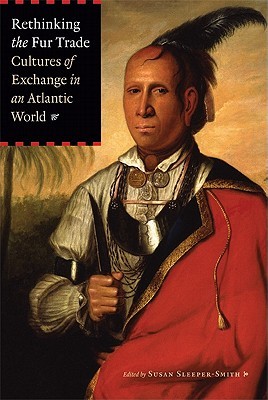
- We will send in 10–14 business days.
- Publisher: University of Nebraska Press
- ISBN-10: 0803243294
- ISBN-13: 9780803243293
- Format: 15.2 x 22.4 x 4.1 cm, softcover
- Language: English
- SAVE -10% with code: EXTRA
Rethinking the Fur Trade (e-book) (used book) | bookbook.eu
Reviews
Description
Lucrative, far-reaching, and complex, the fur trade bound together Europeans and Native peoples of North America in the seventeenth and eighteenth centuries. Rethinking the Fur Trade offers a nuanced look at the broad range of contracts that characterized the fur trade, a phenomenon that has often been oversimplified and misrepresented. These essays show how the role of Native Americans was far more instrumental in the conduct and outcome of the fur trade than previously suggested. Rethinking the Fur Trade exposes what has been called the "invisible hand of indigenous commerce," revealing how it changed European interaction with Indians, influenced what was produced to serve the interests of Indian customers, and led to important cultural innovations. The initial essays explain the working mechanisms of the fur trade and explore how and why it evolved in a North Atlantic context. The second section examines indigenous perspectives through primary-source writings from the period and considers newly evolving indigenous perspectives about the fur trade. The final sections analyze the social history of the fur trade, the profound effect of the cloth trade on Indian dress and culture, and the significance of gender, kinship, and community in the workings of economic exchange. Susan Sleeper-Smith, professor of history at Michigan State University, is the author of Indian Women and French Men: Rethinking Cultural Encounter in the Western Great Lakes and the editor of Contesting Knowledge: Museums and Indigenous Perspectives (Nebraska 2009). Contributors: Dean Anderson, Donald F. Bibeau, Mary Black-Rogers, Bruce J. Bourque, Jennifer S. H. Brown, Allen Chronister, James L. Clayton, Bruce White, W. J. Eccles, William F. Ganong, James A. Hanson, Gail D. MacLeitch, D. Peter MacLeod, D. W. Moodie, Jacqueline Petersen, Carolyn Podruchny, Gail DeBuse Potter, Arthur J. Ray, Timothy J. Shannon, Susan Sleeper-Smith, Helen Hornbeck Tanner, Reuben Gold Thwaites, Sylvia Van Kirk, Richard White, and Ruth H. Whitehead.
- Publisher: University of Nebraska Press
- ISBN-10: 0803243294
- ISBN-13: 9780803243293
- Format: 15.2 x 22.4 x 4.1 cm, softcover
- Language: English English
Lucrative, far-reaching, and complex, the fur trade bound together Europeans and Native peoples of North America in the seventeenth and eighteenth centuries. Rethinking the Fur Trade offers a nuanced look at the broad range of contracts that characterized the fur trade, a phenomenon that has often been oversimplified and misrepresented. These essays show how the role of Native Americans was far more instrumental in the conduct and outcome of the fur trade than previously suggested. Rethinking the Fur Trade exposes what has been called the "invisible hand of indigenous commerce," revealing how it changed European interaction with Indians, influenced what was produced to serve the interests of Indian customers, and led to important cultural innovations. The initial essays explain the working mechanisms of the fur trade and explore how and why it evolved in a North Atlantic context. The second section examines indigenous perspectives through primary-source writings from the period and considers newly evolving indigenous perspectives about the fur trade. The final sections analyze the social history of the fur trade, the profound effect of the cloth trade on Indian dress and culture, and the significance of gender, kinship, and community in the workings of economic exchange. Susan Sleeper-Smith, professor of history at Michigan State University, is the author of Indian Women and French Men: Rethinking Cultural Encounter in the Western Great Lakes and the editor of Contesting Knowledge: Museums and Indigenous Perspectives (Nebraska 2009). Contributors: Dean Anderson, Donald F. Bibeau, Mary Black-Rogers, Bruce J. Bourque, Jennifer S. H. Brown, Allen Chronister, James L. Clayton, Bruce White, W. J. Eccles, William F. Ganong, James A. Hanson, Gail D. MacLeitch, D. Peter MacLeod, D. W. Moodie, Jacqueline Petersen, Carolyn Podruchny, Gail DeBuse Potter, Arthur J. Ray, Timothy J. Shannon, Susan Sleeper-Smith, Helen Hornbeck Tanner, Reuben Gold Thwaites, Sylvia Van Kirk, Richard White, and Ruth H. Whitehead.


Reviews